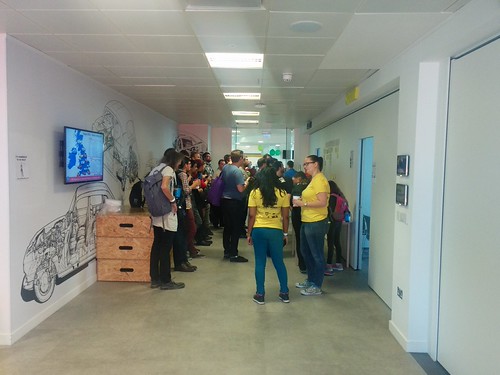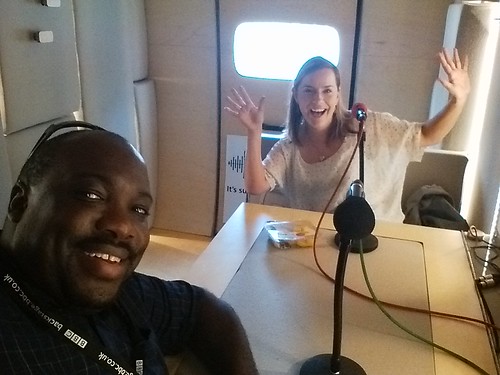
I had a blast at BarCampManchester6 last weekend. Thanks to Claire Dodd for putting on a good BarCamp, and what a great venue. The Autotrader office in First street,
It reminded me of the BarCampLondon’s where the venues were purpose build with actual meeting rooms, etc. BarCampManchester5 for example, although in a lovely venue (SpaceportX) lacked the polish of a purpose build office, so we needed to hire chairs and make spaces.

However that BarCamp will go down in history for starting a number of things. Autotrader was a sponsor and I’m sure that contributed to the discussion about BarCampManchester6?
The other big one is Claire Dodd, who I will freely admit did a lot of the work on BarCampManchester5. Enough to decide to go for it herself – which to be fair is always my plan, hand it off to somebody who makes it their own. This came up in a session later, which I did with Claire about how to run a barcamp. Encouraging others to maybe consider it but also learn from two people who have some experience of doing so.
The BarCampManchester6 went smoothly and although it wasn’t a overnight barcamp, we played Werewolf till 2:30am. You can’t have a barcamp in the UK without Werewolf (I blame Simon Willson for importing werewolf into BarCampLondon1 9 years ago! Maybe I should add it to his wikipedia page?) There were 2 parallel games next to a showing of that cult classic film Hackers (1995! Yes 20years ago!)
I am gutted I didn’t have the guts to follow though on the last game. As the seer but also a lover, I should have gone for the win with my cupid lover but my lover was also the last werewolf. Somehow I convinced myself, the lover connection was too obvious and led the village to kill the werewolf.
Afterwards I skateboarded home kicking myself for not doing it (ok a little drink and skating might have been involved, but I took it carefully, avoiding the clubbers and students going to the warehouse project on store street)

Some of the highlights for me included a few of my own talks.
After looking at the grid for a while, I decided I wanted to do a talk about a few thing, which other talks had touched on. I came with the idea of doing a talk about neurodiversity but felt it wasn’t the right time or place, so substituted it for a talk about the richness of life, getting over rejection and how to be lucky.. Lifting out my own thoughts from blog posts I written a while ago. It was well attended and glad I picked a larger room rather than a small one. A few people commented they enjoyed it quite a bit as it was quite different from the other talks.
Over the first day quite a few people asked what happened to the diversity talk and I said it got rolled into my 2nd talk about being neurodiverse and living with dyslexia. This was much lower attended but there was a guy there who was also dyslexic and explained the coping mechanisms he uses along side my own. It was heart felt, with me admitting maybe too much, except not the stuff I will one day talk about.
I followed up the day afterwards with a talk titled How to be interesting… Not many people came but those who did, were touched by the blogging one.
Start a blog and update it regularly!
blogging or sharing your thoughts are still very important and really helps when referring to points in arguments. Its still what I recommend to many people who ask me where to start. Like above, the interchange of ideas with other peoples thoughts will make you a more interesting person. Also make sure its regular, otherwise you will loose the momentum or build it up too big in your mind.
Katrina Patel, wrote about her view of my talk. Specially about the same point.
One of Ian’s points focused on a blog of his in particular ‘How to be Interesting.’ Now let’s focus on point 2. Start a blog and update it regularly!
I’ve dipped in an out of blogging in the past, but it seems that things didn’t work out. I asked Ian this, and it seems that it’s okay to blog about anything and everything.
Yes indeed, this blog is a mash of my own thoughts and ideas, if you can’t write what you really think about, it will always seem like a chore. Hopefully this will aid in Katrina’s personal brand by making her much more interesting. Good luck Katrina and thanks for the post, let many more flow soon.

At some point of Sunday morning, a few of us got wrapped up in a discussion, while waiting for the BarCamp to start its 2nd day about Startup Culture (real unconference/lobbycon stuff). There was a frustration with the emphases on startup culture and its affect on Manchester’s digital scene.
I took this up into a discussion which pulled in my thoughts about needing more social and community focused startups. I felt the debate was quite balanced about the need for profit making startups but deadly against the silicon valley culture of endless profit and continuous growth. I quoted something from Paul Graham about needing to startup in Silicon Valley.
We decided at the end of the session that we should do something about it all. I remembered the Geeks of London when they wrote the hackday manifesto. Its caused a stir but the best thing was, when people got upset they said fork it if you care so much.

I have to give credit to Teknoteacher (Alan O’Donohoe) who did a nice little session about podcasting in a podcast. He encouraged all of us to record the podcast. So Teknoteacher recorded it on his phone and others like myself recorded it on our devices.
One of my favourite talk of the barcamp was Vimla‘s diversity talk (she had done what I backed out of doing). So good, I convinced Vimla to put in a session at Mozilla Festival along the same lines. Vimla’s rage for diversity was infectious and the people who asked me about my diversity session were all there with lots to say. Vimla’s main point is something I keep banging on about but few people seems to understand.
The movement of women in technology is great and has a long long way to go, but thats only a small part of the diversity problem. Or Diversity is much greater than just male and female. It sounds so obvious but I can’t tell you how many times I have met and talked to people about diversity and they instantly fall back to the women in technology movement.

No! Diversity isn’t simply that!
I even say it myself, what a poor victory it is, if we just add to while middle class women to the existing workforce of white middle class men. Our aim should be the moon not the lower stratosphere. Yes we work backwards but the aim should always be world changing, otherwise what’s the point?
There was quite discussion in the room and some slightly heated things were said (some people should know better, trying to put a hierarchy in place for diversity!), but Vimla kept some pretty dicey discussion on the level. Great work Vimla, look forward to Mozfest.
There were other good talks by many other people including the Happiness talk, Rosie’s Pareidolia and machine learning talk and many more. But Vimla’s talk really took the top spot for me.

The wrap of BarCampManchester6 was full of prizes, which seems to be a tradition coming from BarCampBlackpool. I won something this time instead of being a prize myself (last time a date with me was a prize!). Claire and the team around her did a great job and they got me thinking about doing another BarCamp soon????
Will it happen…? Who knows… but lets say I have retired from running BarCamps 3 times now. Maybe its just time to stay in retirement.
As Claire said in the talk about running your own Barcamp, you can’t help but look at venues and think… This would be a great venue for a BarCamp…



























